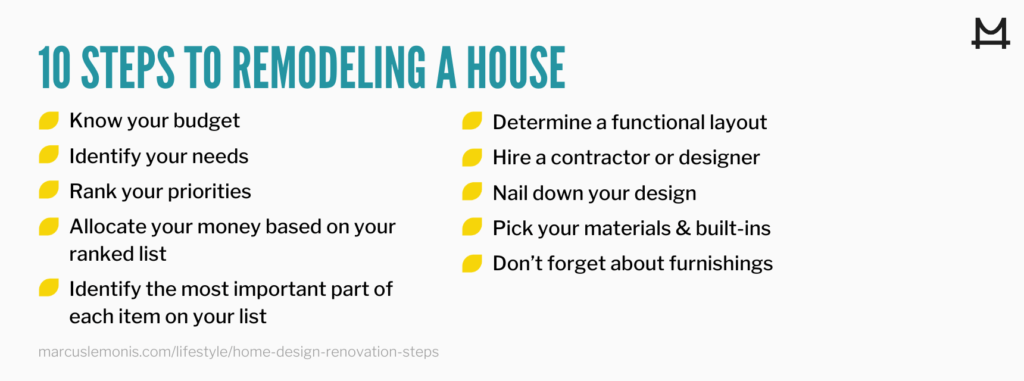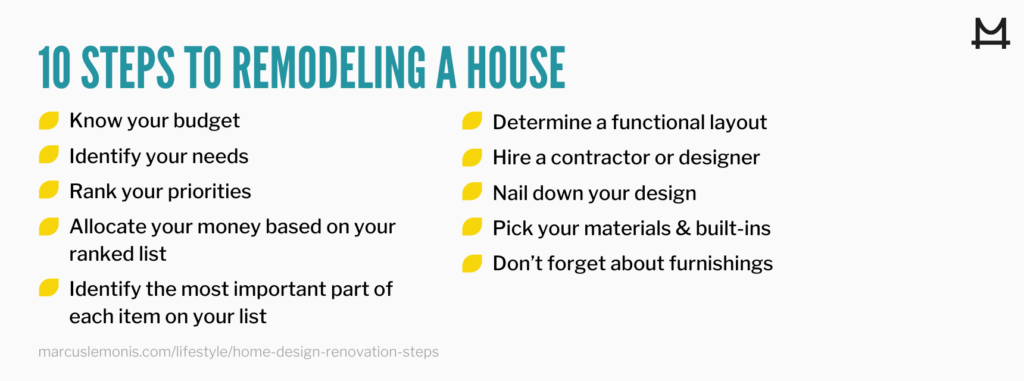Navigating The Process Of Renovating Your Home: Tips And Advice
Are you considering renovating your home but don’t know where to start? The process can be overwhelming and stressful, but with the right tips and advice, it can be a rewarding and exciting journey. In this article, we’ll guide you through the steps of renovating your home, from planning and budgeting to choosing the right contractor and materials, so you can achieve your dream home.
Navigating the Process of Renovating Your Home: Tips and Advice
Are you planning to renovate your home but don’t know where to start? Home renovations can be overwhelming, but with proper planning and organization, it can be a smooth and successful process. Here are some tips and advice to help you navigate the process of renovating your home.
1. Determine Your Budget and Priorities
The first step in any home renovation project is to determine your budget and priorities. Consider how much you can realistically afford to spend on the renovation and what areas of your home need the most attention. Make a list of the renovations you want to make and prioritize them based on your budget and needs.
Once you have determined your budget and priorities, create a detailed renovation plan. This will help you stay on track and avoid overspending. Consider hiring a professional contractor or designer to help you create a plan that meets your needs.
2. Research and Hire a Reputable Contractor
Research and hire a reputable contractor to ensure the renovation is completed to your satisfaction. Look for contractors with a good reputation and experience in the type of renovation you want to make. Ask for referrals from friends, family, and neighbors, and check online reviews and ratings.
Before hiring a contractor, make sure they are licensed and insured. Get a detailed written estimate that includes all the work to be done, materials, and labor costs. Review the contract carefully before signing it, and clarify any questions or concerns you may have with the contractor.
3. Obtain Necessary Permits and Approvals
Before starting any renovation work, make sure you obtain all necessary permits and approvals from local authorities. This includes building permits, electrical permits, plumbing permits, and any other required approvals.
Failure to obtain the necessary permits and approvals can result in fines and legal issues. Your contractor should be familiar with the local regulations and can help you obtain the necessary permits.
4. Plan for Unexpected Costs and Delays
Home renovations can often be accompanied by unexpected costs and delays. Plan for these by setting aside a contingency fund of at least 10% of your total renovation budget. This will help you cover any unexpected expenses or delays that may arise during the renovation process.
5. Communicate Effectively with Your Contractor
Effective communication with your contractor is crucial to the success of your renovation project. Keep an open line of communication and be clear about your expectations and needs. Regularly check in with your contractor to ensure the project is on track and address any concerns or issues as they arise.
6. Stay Organized and Keep Records
Staying organized and keeping records is essential to the success of your renovation project. Keep a detailed record of all expenses, contracts, and permits. This will help you stay on budget and avoid any legal issues.
7. Choose Quality Materials and Products
Choosing quality materials and products is important for the longevity and durability of your home renovation. Consider the long-term benefits of investing in high-quality materials and products, such as energy efficiency and increased home value.
8. Consider Green and Sustainable Options
Consider green and sustainable options for your home renovation, such as energy-efficient appliances, low-flow toilets, and sustainable building materials. These options can not only help the environment but can also save you money on energy bills in the long run.
9. Take Care of Your Home During Renovations
Take care of your home during renovations to avoid any damage or issues. Cover floors and furniture with protective materials, and seal off areas where work is being done to prevent dust and debris from spreading throughout the house.
10. Enjoy Your Newly Renovated Home
Once your home renovation is complete, take the time to enjoy your newly renovated space. Celebrate the hard work you put into the project and enjoy the new features and benefits of your home.
In conclusion, renovating your home can be a challenging but rewarding process. By following these tips and advice, you can navigate the process with ease and create the home of your dreams.
Frequently Asked Questions
What should be my first step in renovating my home?
The first step in renovating your home is to define your goals and budget. Think about what areas of your home you want to improve and what changes you want to make. Consider the current layout of your home and what changes you can make without major structural work. Determine how much you can afford to spend and factor in unexpected expenses.
Once you have a clear idea of what you want to achieve and how much you can spend, it’s time to start planning your renovation project. This may involve hiring a contractor, obtaining permits, and selecting materials and finishes for your home.
How do I choose a reliable contractor for my renovation project?
Choosing a reliable contractor is essential to the success of your renovation project. Start by asking for recommendations from friends and family members who have completed similar projects in the past. Look for contractors who are licensed and insured, and who have experience working on projects similar to yours.
Before hiring a contractor, ask for references and check their reputation with the Better Business Bureau. Get a written estimate for the work to be done, and make sure that all the details of the project are included in the contract. Finally, be sure to communicate clearly with your contractor throughout the renovation process.
What should I consider when selecting materials for my renovation project?
When selecting materials for your renovation project, consider the durability, cost, and style of each option. Look for materials that are easy to maintain and that will stand up to wear and tear over time. Consider the overall style and aesthetic of your home, and select materials that complement your existing decor.
Don’t forget to factor in the cost of installation and any other associated costs when selecting materials. It’s also a good idea to visit showrooms and view samples before making a final decision on your materials.
How can I stay on budget during my renovation project?
Staying on budget during a renovation project can be a challenge, but there are ways to keep costs under control. Start by creating a detailed budget that includes all the costs associated with your project. Be sure to include a contingency fund for unexpected expenses.
Stick to your budget by avoiding unnecessary changes to your project and carefully selecting your materials and finishes. Consider doing some of the work yourself, such as painting or demolition, to save on labor costs. Finally, be prepared to negotiate with your contractor and suppliers to get the best possible prices.
What can I do to minimize the disruption to my daily routine during my renovation project?
Renovating your home can be disruptive to your daily routine, but there are steps you can take to minimize the impact. Start by creating a project schedule and communicating it to your contractor and family members. This will help you plan around the most disruptive phases of the project.
Consider setting up a temporary kitchen or bathroom to use while your main fixtures are being renovated. You may also want to consider staying with friends or family members during the most disruptive phases of the project. Finally, be flexible and patient, and remember that the end result will be worth the inconvenience.
10 HOME RENOVATION TIPS for DIYers & Beginners *What I Wish I Knew Before* | XO, MaCenna
In conclusion, renovating your home can be a daunting task, but it doesn’t have to be. By following these tips and advice, you can navigate the process with ease. Remember to set a budget, hire trusted professionals, and plan ahead to avoid any surprises.
Renovating your home can also be an opportunity to create a space that truly reflects your personality and style. It’s a chance to turn your house into a home that you love and enjoy spending time in. So, don’t be afraid to get creative and think outside the box.
Lastly, remember that the end result will be worth it. A renovated home can increase the value of your property and improve your quality of life. So, take your time, stay organized, and enjoy the process. Happy renovating!




Leave a Reply